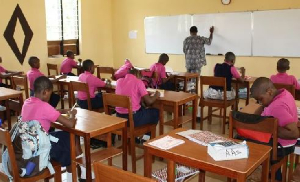The Federal Government has called on state governors to take advantage of its Safe School Transition Plan and domesticate the policy in their various states.
The National Coordinator of Financing Safe Schools in Nigeria, Hajia Halima Iliya, disclosed this in an interview with our correspondent on Friday.
Iliya expressed the government’s commitment to the programme, adding that the administration had demonstrated the political will to implement the policy aimed at safeguarding schools in the country.
She added that the Federal Government had approved the 2026–2030 Transition Plan for Safer Schools nationwide.
The coordinator stated, “The Federal Government is committed and has even given the go-ahead to start working on the 2026 to 2030 Transition Plan.
“This has really shown the political will of the administration of President Bola Tinubu. We are calling on the state governors to key in and domesticate this plan in their various states. Some states have keyed in already. We are calling on the rest to do so.”
The Safe Schools project was launched in 2014 following the abduction of schoolgirls in Chibok, Borno State. It was introduced by the United Nations Special Envoy for Global Education, Gordon Brown, in collaboration with the Nigerian Global Business Coalition for Education and private-sector leaders.
On Friday, armed men reportedly abducted staff and students of St. Mary’s Catholic Primary and Secondary Schools in Papiri, Agwara Local Government Area of Niger State.
The incident followed a similar attack in Maga, Kebbi State, where 25 students were seized earlier in the week.
In Kwara State, more than 50 schools were shut down on Thursday after bandit attacks.
President Bola Tinubu cancelled scheduled trips to South Africa and Angola to coordinate the government’s response to the escalating situation.
Speaking further, Iliya disclosed that states were expected to provide facilities for state response centres, which would monitor schools in real time.
These centres will be integrated into the National Response Coordination Centre, creating a unified security monitoring and response system linking communities, states, and the national hub.
Iliya explained that part of the strategy involved recruiting and training locals to boost school security, particularly in areas where schools lacked perimeter fencing or security presence.
These local personnel, she said, would be trained in intelligence gathering and integrated into the broader security architecture in collaboration with key security agencies.
According to her, the new transition plan reflects the administration’s resolve to tackle persistent attacks on education.
The PUNCH had reported in December 2022 that the Federal Government launched the National Plan on Financing Safe Schools 2023–2026 with a total investment of N144.8bn.
She described the Safe Schools Financing Plan as a broad, multi-sectoral government initiative designed to strengthen security in schools and surrounding communities.
Iliya, who oversees the FG’s Safe School programme under the National Plan, said the initiative had already recorded “achievements,” with functional structures established across all 36 states and the Federal Capital Territory.
“We have established the Safe Protection Squad along with Command and Control Centres deployed nationwide. Safe Schools Coordinators are present in all 36 states, and Safe Schools Desk Officers have been assigned to all 774 local government areas.
“The programme has been fully integrated into security operations, and the Federal Government is investing in technology, surveillance equipment, and other essential logistics,” the coordinator explained.
She noted that the approval to begin work on the 2026–2030 Transition Plan demonstrated the commitment of the current administration and urged state governors to key into the framework by domesticating it in their various states.
“The plan is a robust one, where communities at the local government level will have facilities, and these centres will be manned by all security agencies. If we can get all this in place, the recurrence of attacks on education will significantly reduce,” Iliya said.
General News of Sunday, 23 November 2025
Source: www.punchng.com













